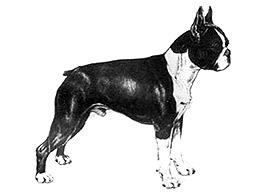Breed standards
Boston Terrier
Breed standards are the official guidelines that describe the ideal characteristics, temperament, and appearance of a breed and ensures that the breed is fit for function with soundness essential.

American Kennel Club Standard dated 28 February 1990
FCI Standard No 140
Adopted in Australia 1 January 1994
Country of Origin: United States of America
The Boston Terrier is a lively, highly intelligent, smooth coated, short headed, compactly built, short-tailed, well balanced dog, brindle, seal or black in colour and evenly marked with white. The head is in proportion to the size of the dog and the expression indicates a high degree of intelligence.
The body is rather short and well knit, the limbs strong and neatly turned, the tail is short and no feature is so prominent that the dog appears badly proportioned. The dog conveys an impression of determination, strength and activity, with style of a high order; carriage easy and graceful. A proportionate combination of "Colour and White Markings" is a particularly distinctive feature of a representative specimen.
"Balance, Expression, Colour and White Markings" should be given particular consideration in determining the relative value of GENERAL APPEARANCE to other points.
Proportions, Substance: The length of leg must balance with the length of body to give the Boston Terrier its striking square appearance. The Boston Terrier is a sturdy dog and must not appear to be either spindly or coarse. The bone and muscle must be in proportion as well as an enhancement to the dog's weight and structure.
Fault: Blocky or chunky in appearance.
Influence of Sex: In a comparison of specimens of each sex, the only evident difference is a slight refinement in the bitch's conformation.
Summary: The clean-cut, short backed body of the Boston Terrier coupled with the unique characteristics of his square head and jaw, and his striking markings have resulted in a most dapper and charming American original: The Boston Terrier.
The Boston Terrier is a friendly and lively dog. The breed has an excellent disposition and a high degree of intelligence, which makes the Boston Terrier an incomparable companion.
The skull is square, flat on top, free from wrinkles, cheeks flat, brow abrupt and the stop well defined. The ideal Boston Terrier expression is alert and kind, indicating a high degree of intelligence. This is a most important characteristic of the breed. The muzzle is short, square, wide and deep and in proportion to the skull. It is free from wrinkles, shorter in length than in width or depth; not exceeding in length approximately one-third of the length of the skull. The muzzle from stop to end of the nose is parallel to the top of the skull. The nose is black and wide, with a well defined line between the nostrils.
Disqualify: Dudley nose. Fault: Pinched or wide nostrils.
The eyes are wide apart, large and round and dark in colour. The eyes are set square in the skull and the outside corners are on a line with the cheeks as viewed from the front.
Disqualify: Eyes blue in colour or any trace of blue.
Fault: Eyes showing too much white or haw.
The ears are small, carried erect, either natural or cropped to conform to the shape of the head and situated as near to the corners of the skull as possible. [Note: Dogs with cropped ears cannot be exhibited in Australia.]
The jaw is broad and square with short regular teeth. The bite is even or sufficiently undershot to square the muzzle. The chops are of good depth, but not pendulous, completely covering the teeth when the mouth is closed.
Serious Faults: Wry mouth; any showing of the tongue or teeth when the mouth is closed.
The length of neck must display an image of balance to the total dog. It is slightly arched, carrying the head gracefully and setting neatly into the shoulders.
The shoulders are sloping and well laid back, which allows for the Boston Terrier's stylish movement. The elbows stand neither in nor out. The forelegs are set moderately wide apart and on a line with the upper tip of the shoulder blades. The forelegs are straight in bone with short, strong pasterns. The dewclaws may be removed.
Fault: Legs lacking in substance.
The back is just short enough to square the body. The topline is level and the rump curves slightly to the set-on of the tail. The chest is deep with good width, ribs well sprung and carried well back to the loins. The body should appear short.
Serious Faults: Roach back, sway back, slab-sided.
The thighs are strong and well muscled, bent at the stifles and set true. The hocks are short to the feet, turning neither in nor out, with a well defined hock joint.
Fault: Straight in stifle.
Front feet are small, round and compact, turned neither in nor out, with well arched toes and short nails.
Hind feet are small and compact with short nails.
Fault: Splay feet.
The tail is set on low, short, fine and tapering, straight or screw and must not be carried above the horizontal.
(Note: The preferred tail does not exceed in length more than one-quarter the distance from set-on to hock.)
Disqualify: Docked tail. Fault: Gaily carried tail.
The gait of the Boston Terrier is that of a sure footed, straight gaited dog, forelegs and hindlegs moving straight ahead in line with perfect rhythm, each step indicating grace and power.
Faults: There will be no rolling, paddling, or weaving when gaited. Hackney gait.
Serious Faults: Any crossing movement, either front or rear.
The coat is short, smooth, bright and fine in texture.
Brindle, seal, or black with white markings. Brindle is preferred ONLY if all other qualities are equal. (Note: SEAL DEFINED. Seal appears black except it has a red cast when viewed in the sun or bright light.)
Disqualify: Solid black, solid brindle or solid seal without required white markings. Grey or liver colours.
Required Markings: White muzzle band, white blaze between the eyes, white forechest.
Desired Markings: White muzzle band, even white blaze between the eyes and over the head, white collar, white forechest, white on part or whole of forelegs and hindlegs below the hocks. (Note: A representative specimen should not be penalised for not possessing "Desired Markings".)
A dog with a preponderance of white on the head or body must possess sufficient merit otherwise to counteract its deficiencies.
Weight not to exceed 11.4 kg (25 lbs).
Any departure from the foregoing points should be considered a fault and the seriousness with which the fault should be regarded should be in exact proportion to its degree and its effect upon the health and welfare of the dog.
Disqualifying:
Eyes blue in colour or any trace of blue.
Dudley nose.
Docked tail.
Solid black, solid brindle, or solid seal without required markings.
Grey or liver colours.
Serious Faults:
Any showing of the tongue or teeth when the mouth is closed.
Wry mouth.
Roach back, sway back, slab-sided.
Any crossing movement, either front or rear.
Faults:
Eyes showing too much white or haw.
Pinched or wide nostrils.
Size of ears out of proportion to the size of the head.
Legs lacking in substance; splay feet.
Straight in stifle.
Gaily carried tail.
There will be no rolling, paddling, or weaving when gaited. Hackney gait.
Scale of Points (For Interest Only):
General Appearance 10
Expression 10
Head (Muzzle, Jaw, Bite, Skull & Stop) 15
Eyes 5
Ears 5
Neck, topline, Body & Tail 15
Forequarters 10
Hindquarters 10
Feet 5
Colour, Coat & Markings 5
Gait 10
Total 100



